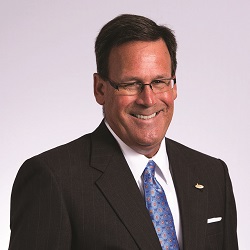Top-Level Takeaways
-
Coastal Credit Union started focusing on diversity and inclusion in 2019.
-
It hired a consultant, increased diversity awareness and practices in-house, and made a commitment to help the community with affordable housing.

Chuck Purvis, President and CEO, Coastal Federal Credit Union
Coastal Federal Credit Union ($3.7B, Raleigh, NC) was working to increase diversity, equity, and inclusion practices within its walls and beyond even before COVID-19struck the United States and George Floyd died while in the custody of Minneapolis police. Those two convulsive events have only deepened the commitment of the Tarheel State cooperative.
In 2019, Coastal laid the groundwork for advancing diversity and inclusion in its workplace by hiring a consultant Diversity & HR Solutions (DHRS) to help build out the creditunion’s commitment to making its core value of welcoming diversity a stronger part of the institution’s culture. Diversity training with 100% employee participation was among the credit union’s annual performance goals and a keypart of its 2020 plan.
Our senior management team participated in two full days of training in March the last thing we accomplished before the COVID-19 crisis became our primary focus, says president and CEO Chuck Purvis. We’ve since gottenback on track and have trained 20% of our employees, with the rest scheduled throughout the remainder of the year.
Credit unions were started as a tool for social change and justice. At Coastal, that remains at the core of why we exist today.
George Floyd And The Need To Do More
The May 25 death of a Black man at the hands of Minneapolis police accelerated the urgency of Coastal’s plans.
The murder of George Floyd and the protests that followed raised the need for us to do more, faster, says Purvis, who joined Coastal in 2001 and took the leadership helm in 2012. Part of our 2020 plan was to hold listening sessionsin the second half of the year. We immediately scheduled three, specifically around coping with the traumas of racism. Based off the initial popularity of the sessions, we continued to add more sessions each week, until sign-ups tapered off.
The credit union hosted 23 sessions in total, with nearly 190 participants from its workforce of approximately 550 FTEs. Purvis says those sessions will continue as long as interest remains. He also outlined two more steps the credit union has takento pull its diversity action plan back on track after the initial shock of COVID-19.
First, the credit created an employee-led diversity, inclusion, and belonging committee. Committee members will serve as internal advocates and advisors to help Coastal’s leaders model the credit union’s value of welcoming diversity and ensuringan inclusive workplace for all.
We’ve finalized a committee charter and are in the process of selecting eight to 10 employees to serve as the initial committee members, Purvis says.
Second, the credit union created the C-level role of chief culture and impact officer.
We needed a senior-level leader focused on understanding the impacts of our company culture both internally and externally and working to ensure our culture grows in positive ways that are consistent with our mission, vision, and values,the CEO says.
The Priority: Doing What’s Right
The Research Triangle-based cooperative also has committed substantial time and money to helping members cope with the impact the coronavirus has had on their personal economies, especially those suddenly jobless.
Purvis says there currently are 21,000 loans that are either in the skip-a-pay program or have been modified, including approximately $130 million in mortgages.
Leaders from credit unions across the country share their views on how the movement can address problems such as unemployment, housing and education affordability, and economic inclusion. Read more in 2 Questions About Helping Members Face Today’s Challenges.
That’s helping to keep a lot of members in their homes, the Coastal CEO says. The No. 1 priority right now is doing what’s right keeping people safe and making sure they aren’t left behind.
But that’s not all the North Carolina cooperative is doing.
Beyond our walls, as COVID unfolded, our foundation pushed out more than $1 million in grants to local organizations, Purvis says.
Specifically, the credit union is focusing on underrepresented populations within the community to help ensure they’re not excluded from relief efforts and have the same opportunities to be part of a recovery.
A Focus On Housing
Coastal has targeted affordable housing with a growing amount of resources over the past few years, Purvis says. The credit union already had in place a strong first-time homebuyer program, according to Purvis.
Both our mortgage and realty teams put in a lot of effort to educate our members about the process of finding and then financing a home, the CEO says.
Atop that, in 2016, Coastal partnered with Habitat for Humanity with a commitment to provide $6 million in low-rate mortgages for Habitat homeowners.
Shortly after that, our foundation added affordable housing to our areas of focus as we began bringing our opportunities for community impact in line with the expertise that we can offer in support beyond money, Purvis says.
An example of that is the labor Coastal volunteers contributed last year during several build days, along with the $200,000 the Coastal Credit Union Foundation donated, to build two Habitat houses in the credit union’s home base of Wake and Durham counties.
Purvis says several of the foundation’s recent grants also address in various ways the need for affordable housing in the community. It’s all a part of adhering to the principles of being a member-owned financial cooperative.
Credit unions were started as a tool for social change and justice, Purvis says. At Coastal, that remains at the core of why we exist today. Today’s environment is fueling the need to address social issues on top of addressingthe economic issues brought on by the pandemic.